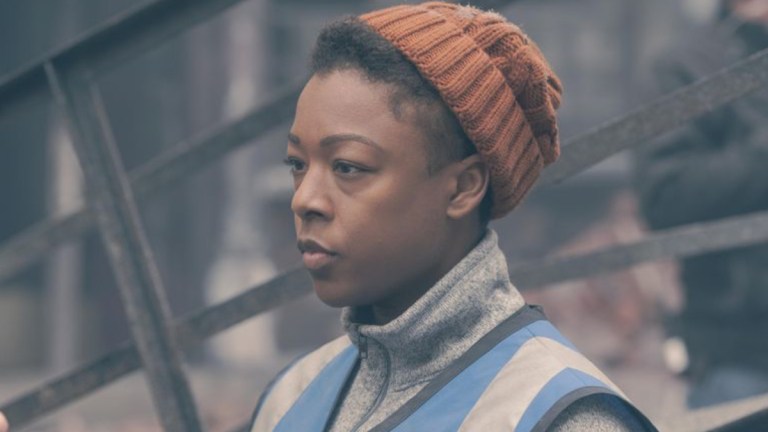The Handmaid’s Tale Season 4 Episode 6 Review: Guilt, Sacrifice, and a New Chapter for June?

This The Handmaid’s Tale review contains spoilers.
There’s really no such thing as understatement on this season of The Handmaid’s Tale, is there? This episode, and the ones preceding it, have played out at a deafeningly high emotional volume. Every speech is emphatic, every exchange is urgent and tear-filled, every decision is literally life or death. It’s a good job that Elisabeth Moss, Samira Wiley and the others are able to pull off this level of sustained intensity, because with a lesser cast or less controlled direction, the high drama could easily turn into melodrama.
If not for the judicious use of pre-Gilead flashbacks as tension-releasing valves, this episode’s force might have been too much to take. That’s always been this show’s natural habitat: teetering on the edge of too-much-to-take, but generally keeping its balance. The scenes of June, Moira and Luke as twenty-somethings negotiating the changes imposed by Luke and June’s impending marriage, provided that balance. They offered respite in an otherwise heightened episode, and underscored June’s present-day anguish over escaping Gilead without Hannah, with her past fear about letting Luke down.
The flashbacks also served to intensify June and Luke’s reunion by reminding us how their relationship used to be (find a more perfect rom-com line than writer Dorothy Fortenberry’s: “What if I’m not who you think I am?” / “Then I’ll just love whoever you turn out to be”). Often, a flashback in The Handmaid’s Tale is there to contrast with the present day and illustrate the chasm between the past and now. Revisiting Luke and June’s early infatuation did the opposite. Seeing June glow at getting a phone call from (presumably) Luke, or his jubilation when they found out they were having a baby, shored up our sense of the couple we saw melt into each other on that ship. The silent conversation Moss and O.T. Fagbenle had with their eyes when Luke walked in was beautifully done.
The aid ship was another new backdrop in a season that’s offered plenty of location variety, the show having long broken out of Gilead’s symmetrical repetition. Like the prison facility in episode three ‘The Crossing’, almost the entire episode was contained on board, which condensed the emotion and tension further, especially once night had fallen and scenes were filmed in almost total darkness. After the authentic-feeling refugee chaos at the port, the ship signified safety… for about 30 seconds (roughly as long as The Handmaid’s Tale ever lets viewers breathe out and relax). Then the Guardian inspection was announced, and the next ticking clock began.
That was the second obstacle, after Oona (Zawe Ashton) told Moira that she wasn’t allowed to take June with them. What a winding blow that was. We’ve waited for June and Moira’s reunion for so long that when it finally happened at the end of ‘Chicago’, it felt like an ending in itself. The idea that international law and bureaucracy might stop it in its tracks felt grossly unfair. The actual gross unfairness though, as this episode was keen to make clear, was June being rescued.
‘Vows’ staged The Handmaid’s Tale’s version of The Trolley Problem, that old ethics thought experiment debating whether one life is worth more than several. In one corner: Moira and the audience, who’ve both invested so much in June Osborne, we couldn’t stand to let her go. In the other corner: Oona and her colleague, who know that saving Gilead’s public enemy number one would put the organisation in contravention of the law, and threaten both diplomatic relations and future aid missions. Traumatised June was unexpectedly on the latter’s side. At first, June offering to turn herself in because her life “isn’t worth more than anyone else’s” felt too perfectly heroic and unselfish, making a paragon of our lead character. And then we were shown what was underneath her act of self-sacrifice: not holiness, but guilt.
June didn’t feel worthy of rescue because of the guilt she feels over her failure to rescue Hannah and the still-missing-presumed-dead Janine. When faced with the prospect of reaching Canada and reuniting with Luke, June spiralled. How could she face him? How could he ever forgive her? Not just for Hannah, but also for falling in love with another man and leaving Luke with his baby to raise in Nichole? The last time Luke heard from June was through the cassette tape in which she explained about her loving relationship with Nick.
Guilt was the emotional driving force of this episode, and perhaps of this entire season. June feels that she’s failed as a mother, telling Moira that everything that she’s responsible for everything that’s happened to Hannah. Moira’s survivor guilt over getting out while June was left in Gilead drove her to sacrifice her relationship with Oona to get June home. The “your fault, your fault” buck of guilt passed between June and Aunt Lydia in ‘The Crossing’ echoed across this episode, as Gilead’s victims turned their blame inwards, as survivors so often do.
This intense episode ended on the long-awaited emotional climax of June stepping foot on Canadian soil, an occasion marked by director Richard Shepard breaking out June Osborne’s signature shot: dead centre of frame, facing the camera. Usually in such shots, June’s eyes are fixed on the viewer as a promise of resistance to some abject horror. This time, they looked out onto a complicated homecoming. Finally out of Gilead, is this the end of June’s fight?
The Handmaid’s Tale season four is streaming now on Hulu in the US. Season four is airing weekly on Sundays at 9pm on Channel 4 in the UK.


